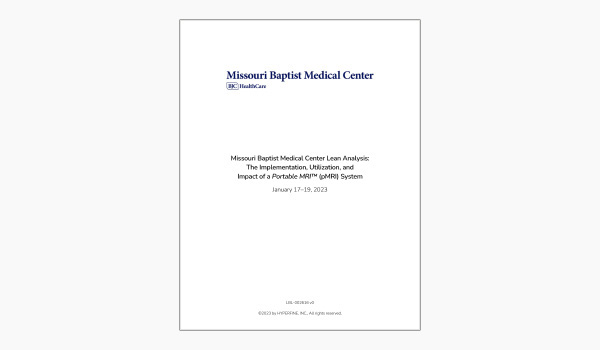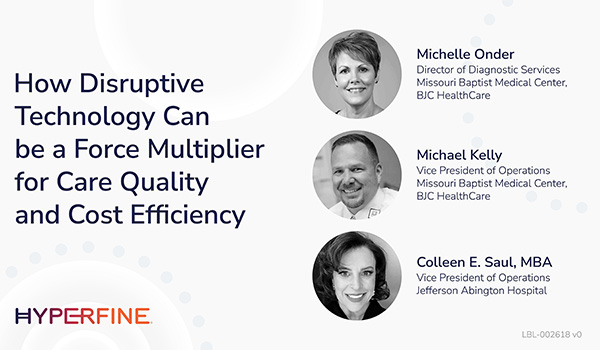How Disruptive Technology Can be a Force Multiplier for Care Quality and Cost Efficiency
Watch Now See All Webinars GET NOTIFICATIONSSummary:
- This blog summarizes the Using Portable MRI as a Force Multiplier for Enhanced Patient Care and Cost Efficiency webinar in which healthcare leaders discuss the importance of physician engagement when acquiring new technology, proving its value, and developing a workflow to utilize it successfully.
- Michelle Onder and Michael Kelly from Missouri Baptist Medical Center discuss how their healthcare facility acquires new technology and review how the Swoop system has improved care and safety for critically ill patients, reduced diagnosis time, increased outpatient volume, and provided labor savings and financial growth opportunities for the hospital.
- Colleen Saul from Jefferson Abington Hospital discusses the adoption of a Swoop system and how it resulted in improved patient and family experiences and clinicians empowered with new technology to enhance patient care progression—as seen in employee and patient satisfaction, reduced left-without-being-seen numbers, and shorter emergency department wait times.
Michael Kelly and Michelle Onder have received compensation from Hyperfine, Inc. for consulting services.
Becker's Healthcare hosted a webinar on "Using Portable MRI as a Force Multiplier for Enhanced Patient Care and Cost Efficiency." The webinar featured three esteemed speakers: Michelle Onder, director of diagnostic services at Missouri Baptist Medical Center; Michael Kelly, vice president of operations at Missouri Baptist Medical Center; and Colleen Saul, vice president of operations at Jefferson Abington Hospital.
The implementation of the Swoop® system at both Missouri Baptist Medical Center and Jefferson Abington Health has been a positive disruption, demonstrating how innovative technologies can revolutionize healthcare delivery and patient outcomes. Key takeaways from the webinar include:
- The importance of physician engagement.
- Proving the value of portable MRI technology.
- Developing a workflow that ensures successful utilization of the new equipment.
Michelle Onder kicked off the webinar discussing the pre-work necessary to implement disruptive technology. When considering the acquisition of a Swoop® Portable MR Imaging® system, the pre-work at Missouri Baptist Medical Center involved understanding the technology and its capabilities, engaging clinical teams and providers, reviewing current data, assessing the impact on the workforce, calculating ROI, and early socialization of the technology with executive leaders to generate curiosity and buy-in.
"I would tell you that this is probably the biggest key step in our preparation, is really looping in our physician partners and our teams to understand what challenges they were up against and to get the early buy-in," Michelle shared.
Michael Kelly shared the success story of implementing the Swoop® Portable MR Imaging® system at Missouri Baptist Medical Center. The implementation process outlined by Mr. Kelly involved careful planning, creating a workflow, training staff and physicians, and celebrating success with the teams involved. He discussed how the Swoop system has significantly impacted patient care, including improved safety for critically ill patients, reduced diagnosis time, and increased outpatient volume. The technology also provided labor savings and financial growth opportunities for the hospital.
After the implementation of the Swoop system, team members at Missouri Baptist Medical Center undertook a lean analysis to explore the impact of the portable MRI (pMRI) system on their neuro ICU, evaluating pre- and post-implementation processes and comparing conventional MRI and pMRI workflows.
"Anytime you spend money on a new technology, the worst thing that can happen is for it to sit in the corner and collect dust," Michael said. "Proof is in the pudding. So, hopefully, you've heard that expression before, but it really is. The value, quality, or truth of something must be judged based on direct experience with it or on its results."
Michelle highlighted the success of the Swoop system at Missouri Baptist Medical Center by sharing, "[The Swoop system] has brought us the opportunity in many avenues to improve our safety and quality—to actually increase our volume in outpatient growth ... we saw great value in this technology very quickly. Since our rollout, we've added over 500 outpatient procedures to our fleet, which is impressive. And we have a 65-minute average turnaround time improvement since implementing..."
Later in the webinar, Colleen Saul shared insights on successfully implementing the Swoop system to disrupt traditional healthcare practices and improve patient care. Initially, decision-makers at Jefferson Abington Hospital rejected Colleen's proposal to implement the Swoop system due to the focus on cost reduction amid the COVID-19 pandemic. However, Colleen and her team revisited the business plan, expanded key stakeholders to include nursing, respiratory, transport, and radiology teams, and reevaluated the impact of the Swoop system on the cost of care. After reviewing Colleen’s second proposal, decision-makers agreed to acquire a Swoop system for the hospital’s ICU.
After the Swoop system's implementation, the hospital saw positive outcomes, improved patient and family experiences, and clinicians empowered with a new tool to enhance patient care progression. In the initial review, the impact was seen in employee and patient satisfaction, reduced left-without-being-seen numbers, and decreased times in the emergency department.
Looking ahead, Jefferson Abington Health aims to expand training, further push the boundaries of the Swoop system's application, and seek philanthropic support for additional systems. Additionally, they plan to do a long analysis to capture and quantify the cost savings and benefits of the Swoop system's usage.
"The implementation of [the Swoop system] has really been disruptive in a very positive way. It has challenged our understanding of what, historically, we considered MRI safety. It has redefined how MRIs can be used and has really made it much easier for our patients, their families, our providers, and our nurses to take care of patients ... We also have some great compliments from many of our staff. So, whether it's the neuro ICU nurses, our director of trauma, Dr. Lemole, who's another huge proponent of [the Swoop system], and our respiratory therapist, everyone is really seeing the value and benefit," Colleen shared.
We invite you to view our webinar or the Missouri Baptist Medical Center lean analysis below. We also invite you to explore our website to learn more about the benefits of the Hyperfine, Inc. Swoop Portable MR Imaging system.
An individual's participation in this event does not constitute an endorsement of any product or service.
Learn More
We invite you to access the lean analysis document or view our webinar with Missouri Baptist Medical Center team members. We also invite you to explore our website to learn more about the benefits of the Hyperfine, Inc. Swoop Portable MR Imaging system.

Missouri Baptist Medical Center Lean Analysis: The Implementation, Utilization, and Impact of a Portable MRI (pMRI) System
